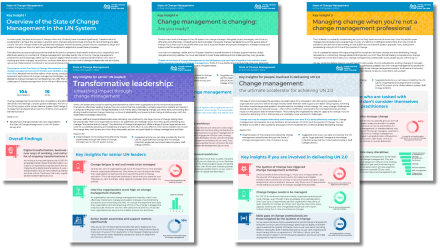
Key insights from the survey
Given the richness and depth of the data we were able to collect through the State of Change Management in the UN System survey, we produced several infographic summaries that provide a condensed overview of the key data points and findings by audience.

Click the + sign next to each heading below to read more and download each summary.
In recent years, the pace and scope of change within the UN family have increased significantly. Transformation is accelerating to achieve the Secretary-General’s vision of empowered individuals driving a forward-thinking and agile culture. Yet such change needs to be guided and managed. More importantly, people need to understand, adopt and sustain change over time. For each new change staff need to adjust and repeat these processes.
This takes structured yet agile approaches that are focused on people so that transformations occur respectfully and effectively, leaving no one behind. Change management provides exactly this. In the UN, change management practitioners are increasingly called upon to support digital transformation, business transformation, new ways of working and other changes. Yet until now, we knew little about how the work of change professionals was structured, resourced, implemented, monitored or perceived and supported.
The purpose of the first State of Change Management in the UN System was to take stock of the practice of change management across UN organizations and establish a baseline from which to track evolutions of the practice over time. Results from the first edition of the survey, conducted in July and August 2023, emphasize the need for systematic applications of change management strategies, methods and tools. This is necessary to optimize the assistance change management professionals can offer their organizations. The survey also shed light on the challenges of change management in the UN and offers solutions.
Senior UN leaders are pivotal for steering transformations within their organizations and for empowering external changes. By effectively leading change, they can ensure that the organization remains responsive, resilient and relevant in a rapidly changing world. Change leadership is not merely about managing change, but rather about envisioning and driving transformational change, fostering a culture of adaptability and ensuring that change initiatives align with the organization’s strategic objectives.
However, staff and external stakeholders alike risk being overwhelmed by the large volume of change taking place simultaneously. That’s why organizations need to be systematic and strategic about how they guide, prioritizing and manage “the people side of change”. The discipline of change management offers a range of proven approaches and tools for successfully adopting and sustaining changes over time. But it is only effective when senior leaders role-model the change they want to see; and when they adequately sponsor and participate in change management activities.
There’s a new kind of manager in the UN system: the change manager. Alongside project managers, who focus on efficiently and effectively completing the technical sides of projects, change managers focus on the people side of change. If you have such a job profile then your role is to guide leaders and people managers to manage change and support staff to accept and adapt to the changes introduced.
Your role is increasingly visible, as the UN system itself and its staff transform to better support Member States navigate emerging realities. You must also adjust to meet these realities and the challenges they may generate.
Thanks to the State of Change Management in the UN System, you now have a baseline from which to track future trends in change and change management. Think of it as a dashboard of sorts to help map your strengths and weaknesses, identify opportunities, and mitigate threats.
The UN family is constantly transforming and you’ve likely been involved in some way. Over the last few years changes have included new programmes of work, UN reforms, modifications stemming from the COVID-19 pandemic and the rise of teleworking as well as ERP and recruitment system upgrades. Now, changes are accelerating owing to UN 2.0 and the Quintet of Change.
You’re consistently tasked with supporting staff to accept and embrace change and even facilitating change discussions or conducting change-related trainings. But you don’t have formal training or experience in change management. Does that make you a change management professional? Some people say yes. Others say no.
We say: While the debate goes on, you still need to help people who are exhausted by existing changes to navigate yet more changes in ways that are effective and as painless as possible. As a non-change-management-practitioner- managing-change, you are encouraged to draw from those change management people, toolboxes and networks available to you. Maybe try on a training, for size. Then decide what you would like to call yourself.
Download key insights if you are managing change but you are not a change management professional
The idea of UN 2.0 expresses the Secretary-General's vision for a UN system with 21st century expertise and organizational culture to deliver stronger results, better Member State support, and faster SDG progress. Achieving this vision requires large-scale systemic transformations, including culture change. Yet, many change initiatives are already being rolled out simultaneously – often without sufficient consideration for interdependencies and their impact on the people side of transformation. This is eating into organizations' leftover capacity for change. If you’re involved in delivering UN 2.0, chances are you’ve already come across such challenges.
Change can only be adopted effectively and sustained over time if it is being effectively managed. Change management can therefore be a key facilitator and accelerator of UN 2.0 and the Quintet of Change. You can embrace it yourself or draw guidance and support from the skilled UN workforce already facilitating change.